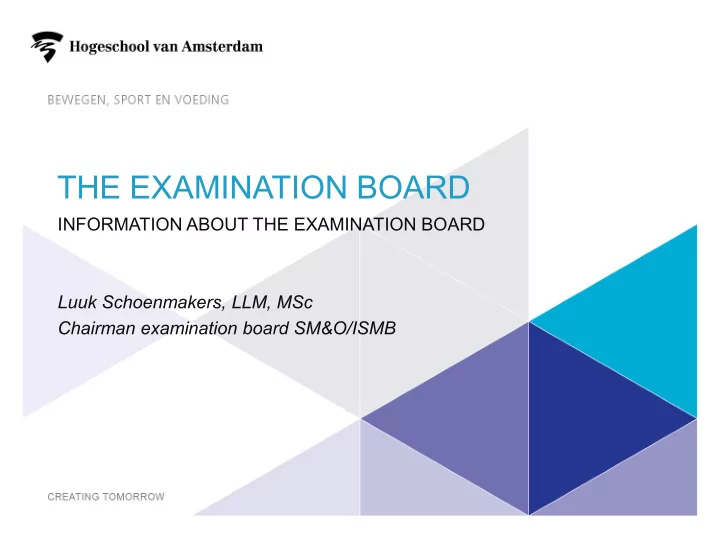

THE EXAMINATION BOARD INFORMATION ABOUT THE EXAMINATION BOARD Luuk Schoenmakers, LLM, MSc Chairman examination board SM&O/ISMB 1
CONTENT • What is the examination board? • What is the TER? • BSA first year • Fraud/plagiarism 2
THE EXAMINATION BOARD • Responsible for the quality of the ISMB programme: exams and assessments • To lecturers: take care about the quality of the exams. • To students: take care about a studying programme, checks on fraud/plagiarism and to impose sanctions, take care about entry requirements • Requests and complaints 3
WHEN DO YOU GO TO THE EXAMINATION BOARD? Always consult with your coach before you contact the examination board! • To commence for a minor • Requests for exemptions • Complaints and requests • If you have a ‘problem’ with the exam. Always consult with the lecturer! • For personal circumstances and binding study advice. Go to the student counsellor and your coach; at the end of the year to the examination board! 4
WHEN DO YOU NOT GO TO THE EXAMINATION BOARD? Missing an exam through problems with public transport, bike, car, illness and so on. • Decision is (almost) always: “no extra opportunity”. • When you’ve missed a lesson while it was a mandatory lesson. Consult with the lecturer. 5
TER • See A-Z list / page of the examination board • Read it through; summary of appointments for you (rights and obligations) • For example: • There should be offered two opportunities per year (no right to two opportunities!) • The results should be determined by the lecturer(s) within 15 working days via sis • Conditions for certain components (e.G. Requirements for minors or studying abroad or starting with your graduation project) 6
BSA • This year: achieve a minimum of 50 ETCS/credits (In order to be allowed to commence a minor in year 3/internship you must have completed the foundation year) SIS CHECK! 7
PLAGIARISM/FRAUD • "Plagiarism occurs when data or sections of a text from others are transferred without reference to a resource“ • “Taking work from someone else and passing it off as your own work” • Full list in writing guide • This includes giving the opportunity consciously ("take it from me") • Plagiarism is “not-intentionally " 8
PLAGIARISM/FRAUD “Fraud is defined when a student intentionally breaks the rules.” Examples: • A full copied paper of which the student pretends that it is his/her own work 9
PROCEDURE • On suspicion, the lecturer makes a report and sends it to the examination board. The student has the opportunity to be heard. • The mark will not be granted until the examination board has made a decision. • Consequences: 10
SANCTIONS • Fraud in SIS + note in file. Hand in next possibility • Fraud in SIS + note in file + exclusion of achieving credits for a maximum of 3 months. • Fraud in sis + note in file + exclusion of achieving credits for a maximum of 1 year. 11
REPEAT • Heavier sanctions + possibility to be removed from the program. 12
DROPBOX - URKUND • All documents that will be hand in digitally will be scanned and compared with: – Internet – Older files in the database – Mijnhva 13
RECOMMENDATIONS • To prevent is better than cure, be careful with your work files. • Read the writing guide regarding the rules on citing etc. • Not just provide products (and if, then pdf) 14
QUESTIONS? 15
Recommend
More recommend